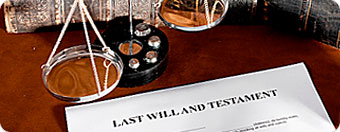In the normal course of the administration of a deceased estate, Probate is granted by filing an application for probate or letters of administration supported by an affidavit — see Chapter 15, Part 3 UCPR.
Rule 602(2) UCPR requires the affidavit to exhibit the original Will, any Codicil and any other document that may be a Will or Codicil.
It is not uncommon for such testamentary instruments (hereafter referred to as the Will), to be either lost or missing on the deceased’s death.
At common law, there is a presumption that a testator destroyed a Will with the intention of revoking it, where the Will was in the custody of the testator and it is either lost or missing on the death of the testator — Welch v Phillips (1836) 1 Moo PCC 299; 12 ER 828 per Lord Wensleydale at 302 (“Moo PCC”) where his Lordship said:
“If a will, traced to the possession of the deceased, and last seen there, is not forthcoming on his death, it is presumed to have been destroyed by himself; and that presumption must have effect, unless there is sufficient evidence to repel it. It is a presumption founded on good sense; for it is highly reasonable to suppose that an instrument of so much importance would be carefully preserved, by a person of ordinary caution, in some place of safety, and would not be either lost or stolen; and if on the death of the maker it is not found… it is in a high degree probable, that the deceased himself has purposely destroyed it”.
The presumption also applies to documents incorporated by reference into a will — Guest v Webb [1965] VR 42; Re Holmes [1934] QWN 20.
The presumption may be rebutted by the surrounding circumstances or from the contents of the last known Will — McCauley v McCauley (1910) 10 CLR 434 and the standard of proof is the ordinary civil standard – on the balance of probabilities — Whiteley v Clune (No.2) The Estate of Brett Whiteley (13 May 1993 unreported — Supreme Court of NSW — BC 9301902); In the Estate of Wipperman; Wissler v Wipperman [1953] 2 WLR 706; Cahill v Rhodes [2002] NSWSC 561 at 56.
Additionally, it may be possible to rely upon legislation dispensing with the formalities for a valid Will, to allow an informal document such as an unexecuted copy of a Will, to be admitted to Probate if the court is satisfied that the document was prepared by the deceased and intended to be testamentary.
Section 18 of the Succession Act 1981 (Qld) provides:
“18 Court may dispense with execution requirements for will, alteration or revocation
(1) This section applies to a document, or a part of a document, that–
(a) purports to state the testamentary intentions of a deceased person; and
(b) has not been executed under this part.
(2) The document or the part forms a will, an alteration of a will, or a full or partial revocation of a will, of the deceased person if the court is satisfied that the person intended the document or part to form the person’s will, an alteration to the person’s will or a full or partial revocation of the person’s will.
(3) In making a decision under subsection (2), the court may, in addition to the document or part, have regard to–
(a) any evidence relating to the way in which the document or part was executed; and
(b) any evidence of the person’s testamentary intentions, including evidence of statements made by the person.
(4) Subsection (3) does not limit the matters a court may have regard to in making a decision under subsection (2).
(5) This section applies to a document, or a part of a document, whether the document came into existence within or outside the State.”
If this course is adopted, it will still be necessary to address the principles governing the admission of lost or missing Wills including the rebuttal of the presumption of destruction animo revocandi.
In some jurisdictions, for example South Australia, there are specific provisions in the rules of court that allow for an applicant to apply for an order admitting a photocopy of the deceased’s executed Will to Probate — Rule 68 of the Probate Rules 2004 (SA) and see In the Estate of Jack Hamilton Gerard Deceased [2007] SASC 362.
There is no comparable provision in the UCPR in Queensland.
In the recent decision of his Honour Justice McMeekin in Price v Tickle & Ors [2011] QSC 206 (delivered on 3 August 2011), the deceased had left more than one will but the most recent of which could not be located. The question arose whether the previous Wills should be presumed revoked.
At paragraph 10 of the judgment, his Honour applied the reasoning of Powell J in Whiteley v Clune (No.2) The Estate of Brett Whiteley (13 May 1993 unreported — Supreme Court of NSW — BC 9301902) and held that the present position in Queensland in relation to lost or missing wills was as follows:
“… 1. although, where a Will is traced into the possession of the testator and is not forthcoming on his death, there is a presumption that he destroyed it animo revocandi, the presumption may be rebutted; 2. the strength of the presumption depends upon the character of the testator’s custody over it (Sugden v Lord St Leonards (1876) LR 1 PD 154; Allan v Morrison [1900] AC 604; McCauley v McCauley (1910) 10 CLR 434); 3. where the Will makes a careful, and complete, disposition of the testator’s property, and there are no other circumstances to point to a probable destruction, animo revocandi, by the testator, the presumption is so slight that it may be said not to exist (Sugden v Lord St Leonards (supra); Finch v Finch (1867) LR 1 P and D 371); 4. where a Will is lost or destroyed, and the presumption of destruction, animo revocandi, either, does not arise, or, is rebutted, its contents may be proved by parol evidence. The ‘rules’ laid down in Sugden v Lord St Leonards (supra) are as follows: â a. the contents of any lost instrument, including a will, may be proved by secondary evidence; b. written and oral declarations of a testator made before, or after, the execution of the will are admissible as secondary evidence of its contents; c. the evidence of a single witness, although interested, is admissible to prove the contents if his veracity and credibility are unimpeached; d. Probate may be granted of so much of the contents as may be proved, even though proof is not available of the entirely (sic).”
 In Frizzo v Frizzo [2011] QSC 107 (delivered 12 May 2011), his Honour Justice Applegarth was concerned with the admission to Probate of a photocopy Will where the original could not be found.
In Frizzo v Frizzo [2011] QSC 107 (delivered 12 May 2011), his Honour Justice Applegarth was concerned with the admission to Probate of a photocopy Will where the original could not be found.
His Honour at paragraph 161, adopted the test propounded by Justice Campbell in Cahill v Rhodes [2002] NSWSC 561 at 55 where his Honour said that for a lost will to be admitted, five matters must be established:
1) That there actually was a Will or a document purporting to embody the testamentary intentions of a deceased;
2) That document revoked all previous Wills;
3) The presumption that when a Will is not produced it has been destroyed must be overcome;
4) There must be evidence of its terms; and
5) There must be either evidence of due execution or that the deceased intended the document to constitute his or her Will.
As a matter of practice and procedure, it is generally a condition of the grant of Probate that the applicant for probate of a lost Will has obtained the consent of all parties interested in the estate.
However, there is a line of authority that suggests that this is not an absolute condition — In the Goods of Pearson [1896] P 289; In the Goods of Apted [1899] P 272; Re Daniels [1904] QWN 26; Re Baynton [1908] QWN 46; Re Gardon [1918] QWN 7 and Re Henderson [1996] 1 Qd R 249.
It is submitted that in addition to the issue of consent of the interested parties, an applicant propounding a photocopy Will should also establish the following matters:
1) the circumstances surrounding the loss of the original Will;
2) the efforts made to find the original Will;
3) the accuracy of the copy of the Will put forward for proof;
4) whether advertisements have been published for the missing Will and whether any reply has been received; and
5) lodgment of a complete copy of the document the Court is asked to admit to Probate.
While the presumption of revocation is one of the more difficult obstacles to overcome in such proceedings, it is nevertheless a rebuttable presumption.
The most important factor to establish in such proceedings is that the Will being propounded in fact reflects the testator’s true testamentary intentions.
Joseph Jacobs
Equity Chambers




 In Frizzo v Frizzo [2011] QSC 107 (delivered 12 May 2011), his Honour Justice Applegarth was concerned with the admission to Probate of a photocopy Will where the original could not be found.
In Frizzo v Frizzo [2011] QSC 107 (delivered 12 May 2011), his Honour Justice Applegarth was concerned with the admission to Probate of a photocopy Will where the original could not be found.